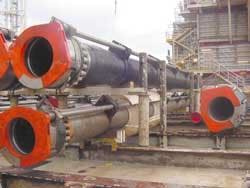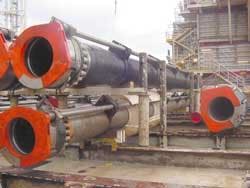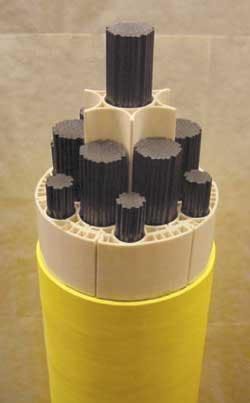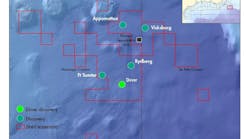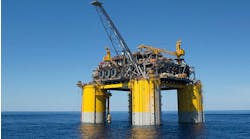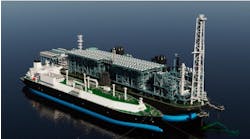Kværner Oilfield Products (KOP), now part of the Aker Kværner group, is close to completing the development of two composite products, a riser and a tether, for the offshore market. Development of both products has been conducted under a technology alliance with Conoco.
A field test on the riser, known as CompRiser, was completed earlier this year at Statoil's Heidrun Field in the Norwegian Sea. The 15-m, 22-in. riser test joint was installed at three different locations in the drilling riser string, and was in place during full drilling operations on three wells.
As part of the verification program, the joint was brought to shore after each well for a full inspection program carried out by DNV. No damage or deterioration was found following the completion of the test period, according to David Brunt, KOP's general manager for deepwater composites. The product had already undergone rigorous qualification on land, including impact tests, burst tests to 15,850 psi and fatigue testing to prove the 150-year lifetime.
The offshore trial for CompRiser was the culmination of a joint industry development project backed by Chevron, Norsk Hydro, Petrobras, Shell, Statoil, and the European Union, which provided funding through the Thermie program.
The basic structure of the test joint consists of multiple layers of carbon fiber and epoxy resin composite wound around a thin-walled titanium liner. Titanium has been used for Heidrun as the drilling riser is made from titanium. For general purposes, however, CompRiser will be manufactured with a steel liner and end-fittings, Brunt said.
CompTether
Kværner's CompTether development is supported by Norway's Demo 2000 program. The project consists of two phases; manufacturing, testing, and qualification of a CompTether prototype, which is close to completion; and testing and qualification of some of the installation procedures, which is ongoing. A survival test of a full CompTether cross-section was successfully carried out by DNV, one of the project partners, in February at its facilities in Bergen.
Over the years the cost of carbon fiber for composite materials has become increasingly competitive, falling to around $5-7/lb from as high as $150/lb in the early 1970s. At current price levels, the cost of a composite riser or tether will be only marginally higher than that of equivalent steel products. However, being lighter than the steel products, the composite products offer other cost savings, which become more substantial as the water depth in which they are used increases. It is in the deepwater market that the advantages of composite materials really come to the fore, Brunt says.
The lighter weight of the composite products reduces the loads on the platform, and thereby its required displacement, while the composite tether also has the advantage that it can be reeled and easily transported to the field rather than having to undergo a risky tow, as is the case for conventional steel tethers. To take the example of a tension-leg platform installed in 2,000-m, such a platform, using both composite riser and tethers, could reduce its displacement to less than 15,000 tonnes, compared with at least 25,000 tonnes if equipped with steel riser and tethers. Another way of looking at it is that the use of composite products extends the application envelope for the TLP down to 3,000 m.
All types of deepwater platform can benefit from the composite riser, and Brunt sees opportunities for marketing all types of top-tensioned risers, whether for drilling, workover or production, and also risers for mobile drilling rigs.
CompRiser is ready for the market now, and CompTether will be ready before summer, Brunt says. Kværner and Conoco plan to set up a joint-venture company to market the products, aiming their efforts mainly at the Gulf of Mexico, West Africa, and Brazil. KOP and Spencer Composites Corporation will fabricate the CompRiser in the USA. Fabrication of the CompTether will initially take place at KOP's Moss umbilical plant in Norway or, when it comes into operation, its new umbilical plant in Houston.
